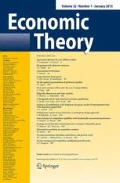Abstract
We examine the role that belief, network externality, and information aggregation play in inefficient market collapses. After receiving consecutive negative shocks, some ex-ante identical Bayesian agents will be discouraged about the unknown state of the market they invest; therefore, they will stop investing. This decision will have two effects: first, it will cause agents to aggregate information through social/observational learning; second, it will decrease the network externality effect. We show that there might be an inefficient market collapse if the externality effect diminishes too much, and the cost of re-entry to the market is too high. We also analyze the effects of strategic delay and experimentation on the exit decision of the agents.
Similar content being viewed by others
References
Aoyagi M. (1998) Equilibrium delay in a simple dynamic model of investment. Econ. Theory 12, 123–146
Bergemann D., Valimaki J. (2000) Experimentation in markets. Rev. Econ. Stud. 67, 213–234
Berry D.A., Fristedt B. (1985) Bandit problems: Sequential allocation of experiments. Chapman and Hall, London
Caplin A., Leahy J. (1994) Business as usual, market crashes, and wisdom after the fact. Am. Econ. Rev. 84, 548–565
Chamley C.P. (2004) Rational herds: economic models of social learning. Cambridge University Press, Cambridge
Chamley C., Gale D. (1994) Information revelation and strategic delay in a model of investment. Econometrica 62, 1065–1085
Heidhues P., Melissas N. (2006) Equilibria in a dynamic global game: the role of cohort effects. Econ. Theory 28, 531–557
Jeitschko T.D., Taylor R.C. (2001) Local discouragement and global collapse: a theory of coordination avalanches. Am. Econ. Rev. 91, 208–224
Keller G., Rady S., Cripps M. (2005) Strategic experimentation with exponential bandits. Econometrica 73, 39–68
Murto P., Valimaki J.: Learning in a model of exit. Mimeo (2006)
Author information
Authors and Affiliations
Corresponding author
Additional information
I especially thank Thomas D. Jeitschko, Matthew Mitchell, B. Ravikumar Ted Temzelides. I also thank anonymous referees, an associate editor, John Conlon, Larry Samuelson, Troy Tassier, Stephen Williamson, and seminar participants of the University of Saskatchewan, Georgia Tech, Concordia University, University of Manitoba, Iowa Alumni Workshop, Midwest Economic Theory Conferences held at Indiana Bloomington, and Notre Dame, and 1st International Conference on Business, Management and Economics organized by Yasar University.
Rights and permissions
About this article
Cite this article
Gunay, H. The role of externalities and information aggregation in market collapse. Economic Theory 35, 367–379 (2008). https://doi.org/10.1007/s00199-006-0158-7
Received:
Accepted:
Published:
Issue Date:
DOI: https://doi.org/10.1007/s00199-006-0158-7
Keywords
- Social (observational) learning
- Information aggregation
- Strategic delay (waiting)
- Experimentation
- Coordination avalanche
- Optimal stopping



